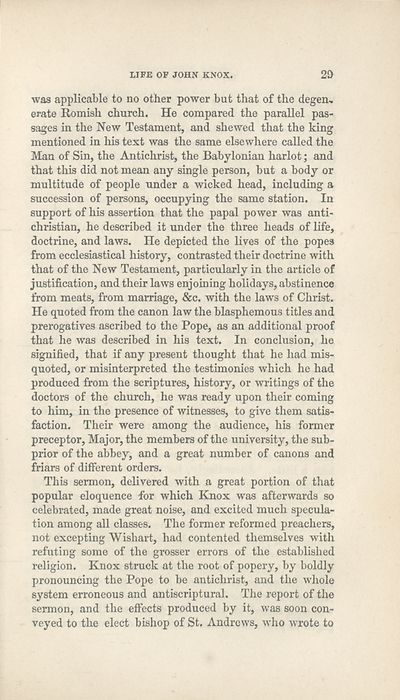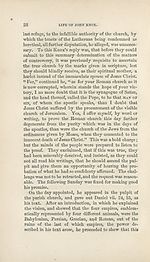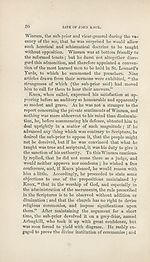Download files
Complete book:
Individual page:
Thumbnail gallery: Grid view | List view

LIFE OF JOHN KNOX.
20
was applicable to no other power but that of the degen.
erate Romish church. He compared the parallel pas¬
sages in the New Testament, and shewed that the king
mentioned in his text was the same elsewhere called the
Man of Sin, the Antichrist, the Babylonian harlot; and
that this did not mean any single person, but a body or
multitude of people under a wicked head, including a
succession of persons, occupying the same station. In
support of his assertion that the papal power was anti-
christian, he described it under the three heads of life,
doctrine, and laws. He depicted the lives of the popes
from ecclesiastical history, contrasted their doctrine with
that of the New Testament, particularly in the article of
justification, and their laws enjoining holidays, abstinence
from meats, from marriage, &c. with the laws of Christ.
He quoted from the canon law the blasphemous titles and
prerogatives ascribed to the Pope, as an additional proof
that he was described in his text. In conclusion, he
signified, that if any present thought that he had mis¬
quoted, or misinterpreted the testimonies which he had
produced from the scriptures, history, or writings of the
doctors of the church, he was ready upon their coming
to him, in the presence of witnesses, to give them satis¬
faction. Their were among the audience, his former
preceptor, Major, the members of the university, the sub¬
prior of the abbey, and a great number of canons and
friars of different orders.
This sermon, delivered with a great portion of that
popular eloquence for which Knox was afterwards so
celebrated, made great noise, and excited much specula¬
tion among all classes. The former reformed preachers,
not excepting Wishart, had contented themselves with
refuting some of the grosser errors of the established
religion. Knox struck at the root of popery, by boldly
pronouncing the Pope to be antichrist, and the whole
system erroneous and antiscriptural. The report of the
sermon, and the effects produced by it, was soon con¬
veyed to the elect bishop of St. Andrews, who wrote to
20
was applicable to no other power but that of the degen.
erate Romish church. He compared the parallel pas¬
sages in the New Testament, and shewed that the king
mentioned in his text was the same elsewhere called the
Man of Sin, the Antichrist, the Babylonian harlot; and
that this did not mean any single person, but a body or
multitude of people under a wicked head, including a
succession of persons, occupying the same station. In
support of his assertion that the papal power was anti-
christian, he described it under the three heads of life,
doctrine, and laws. He depicted the lives of the popes
from ecclesiastical history, contrasted their doctrine with
that of the New Testament, particularly in the article of
justification, and their laws enjoining holidays, abstinence
from meats, from marriage, &c. with the laws of Christ.
He quoted from the canon law the blasphemous titles and
prerogatives ascribed to the Pope, as an additional proof
that he was described in his text. In conclusion, he
signified, that if any present thought that he had mis¬
quoted, or misinterpreted the testimonies which he had
produced from the scriptures, history, or writings of the
doctors of the church, he was ready upon their coming
to him, in the presence of witnesses, to give them satis¬
faction. Their were among the audience, his former
preceptor, Major, the members of the university, the sub¬
prior of the abbey, and a great number of canons and
friars of different orders.
This sermon, delivered with a great portion of that
popular eloquence for which Knox was afterwards so
celebrated, made great noise, and excited much specula¬
tion among all classes. The former reformed preachers,
not excepting Wishart, had contented themselves with
refuting some of the grosser errors of the established
religion. Knox struck at the root of popery, by boldly
pronouncing the Pope to be antichrist, and the whole
system erroneous and antiscriptural. The report of the
sermon, and the effects produced by it, was soon con¬
veyed to the elect bishop of St. Andrews, who wrote to
Set display mode to:
![]() Universal Viewer |
Universal Viewer | ![]() Mirador |
Large image | Transcription
Mirador |
Large image | Transcription
| Antiquarian books of Scotland > Scotland/Scots > Life of John Knox ; and, The life of Alexander Henderson > (47) |
|---|
| Permanent URL | https://digital.nls.uk/131832868 |
|---|
| Description | Thousands of printed books from the Antiquarian Books of Scotland collection which dates from 1641 to the 1980s. The collection consists of 14,800 books which were published in Scotland or have a Scottish connection, e.g. through the author, printer or owner. Subjects covered include sport, education, diseases, adventure, occupations, Jacobites, politics and religion. Among the 29 languages represented are English, Gaelic, Italian, French, Russian and Swedish. |
|---|

